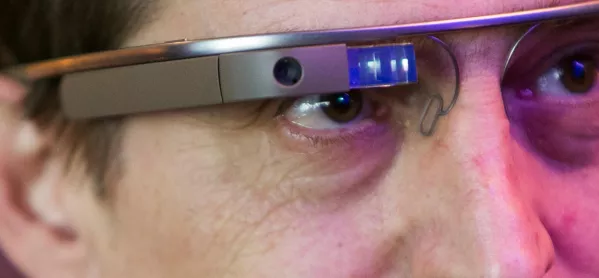“Smart glasses” that give teachers detailed real-time information on how each student is learning can help pupils do better in class, according to a new study.
The research, published today at the London Festival of Learning, looked at the effect of teachers using special Lumilo glasses, which allow them to check individual performance during lessons, while simultaneously keeping an eye on the class.
Researchers from Carnegie Mellon University in Pittsburgh, US, gave teachers the “mixed-reality” glasses - which look similar to virtual-reality headsets - to use during lessons in which students were working with a computerised mathematics tutor.
By programming in class seating plans, teachers could see a personalised display pop up on their glasses above each student’s head, with the option to make a tap gesture in mid-air to see a detailed “deep dive” set of individual data.
The glasses also put up emoji-style symbols above students - to alert the teacher when pupils were struggling, when they were attempting to “game” the system or had simply stopped working for over two minutes. Teachers were then able to provide one-to-one support as needed.
‘The promise of artificial intelligence’
It is the first experimental study which shows that pupils can learn more if the artificial intelligence of a maths tutoring programme, which provides students with step-by-step guidance and allows them to work at their own pace, is combined with support from human teachers.
Working with the technology, teachers can help to motivate students or come up with new ways to explain a concept.
“By alerting teachers in real-time to situations, the ITS [intelligent tutoring system] may be ill-suited to handle on its own. Lumilo facilitates a form of mutual support or co-orchestration between the human teacher and the AI tutor,” said Ken Holstein, lead author on the study, together with Bruce M. McLaren and Vincent Aleven.
“This research illustrates the promise of artificial intelligence systems that integrate human and machine intelligence to support student learning.”
The research focused on 286 middle-school students aged 10 to 13 and eight experienced teachers in four public schools in the US. The pupils were using Lynnette, an intelligent tutoring system for linear equations.
The researchers assessed the results in three situations: when the teacher used the smart glasses and was alerted to when students needed help and had access to pupil data; when the teachers had the smart glasses but were only alerted when students needed help but did not have access to data; and when teachers did not have the smart glasses and no access to real-time analytics.
Tests taken by pupils before and after the lessons revealed they did better when teachers wore the smart glasses and learned most when teachers also had access to the analytics.
“Our findings indicate that teachers’ use of Lumilo, a real-time awareness tool, resulted in higher learning gains with the ITS. In addition, presenting teachers with real-time analytics about student learning, metacognition, and behavior at a glance had a positive impact on student learning with the ITS, above and beyond the effects of monitoring support alone,” the research paper states.
The researchers also found that having access to data through the glasses appeared to drive teachers’ time towards students of lower prior ability - narrowing the gap in learning between students who scored more highly before the tests and those with lower prior achievement.
Even where teachers had only basic data available through the glasses, students were less likely to try to “game” the maths programme.
“The observed learning benefits of monitoring support may be due to a motivational effect, resulting from students’ awareness that a teacher is monitoring their activities in the software,” the report states.
* Student Learning Benefits of a Mixed-reality Teacher Awareness Tool in AI-enhanced Classrooms, by Kenneth Holstein, Bruce M. McLaren and Vincent Aleven (Carnegie Mellon University, Pittsburgh), is being presented at the International Conference on Artificial Intelligence in Education as part of the 2018 London Festival of Learning.





